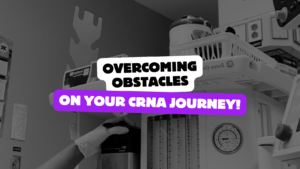So you just heard the words “Congratulations, you’re accepted” and now your journey to CRNA school begins. First, I am extremely happy for you! But I know there are a lot of emotions, worries and uncertainties that come along with this huge accomplishment.
I had very little time to prepare for the start of CRNA school. I was on the waiting list for months and found out about 3 months before the start of my program that I was accepted. And looking back on my time as newbie coming into CRNA school, I realize I did not prepare as well as I could have.
I definitely wasn’t ready for the pace of the program, endless hours of studying, multitude of tests and lots of people telling you how bad you suck on a daily basis. But you know what, I SURVIVED all the highs and lows of CRNA school and so WILL you.
7 Easy Ways to Prepare for CRNA School
After much reflection on my time as a student nurse anesthetist, I have compiled these tips to not only make sure you are prepared for CRNA school but you thrive as well.
Take care of your health and wellness
While I was in CRNA school I will admit I was not the healthiest and my weight was up and down. I basically spent my days just putting one foot in front of the other. But my friend and fellow classmate, Ruby, always made time to go to the gym and eat a balanced meal. I really admired this about her but I just never felt I had the time to take care of myself.
However, I wish I had of and because your health and wellbeing is important and paramount to your success in your CRNA program. And you will find your health, school and family is all connected, basically they support each other.
So take the time now to start working on yourself. Here are some ways to get started:
- Get enough sleep
- Drink plenty of water
- Minimize your sugar intake
- Prepare your meals ahead of time
- Think positive
- Eat plenty of vegetables
- Exercise
Get organized
One of the biggest adjustments you will face in CRNA school is the steep learning curve and fast pace of the program. The information you will obtain on a daily basis is often described as “drinking from a water hose” and this is so true. You will likely have never experienced anything like it before. Therefore, you doing well in nurse anesthesia school requires you to be organized from the jump.
Students that come in and try the “figure it out as I go approach” don’t perform well in school and often find themselves overwhelmed by the intense demands of CRNA school. It all comes down to you prioritizing, developing a system, being flexible and staying organized so you don’t fall behind.
Be confident
Discovering how to be confident is not a quick fix but if you shift your mindset right now will help you tremendously in CRNA school. One reason many of us suffer from lack of confidence is the constant thought that I am not good enough or I don’t deserve to be in crna school. But in crna school you have to give yourself permission to not know everything while in crna school which why you are in school. Also you need to know you are not alone in this way of thinking.
Some ways to overcome it is by speaking daily affirmations about all you have accomplished thus far. Also share your thoughts with a friend, mentor or even a counselor. In my situation I spent the first few months of school in counseling services. Again this took away time from my family and studying which is why I would begin on working on this now.
Know how you learn best
Understanding your learning style is critical because it may be the deciding factor in whether or not you receive your nurse anesthesia degree. Take the time now to research how you learn best and begin creating your very own personalized study system.
I created my study system while in the program and this is not what you want to do. This required a lot of research on my part and took away time I could have spent with my family or studying. Here is how I began to create my system in a nutshell:
- I defined my core principles which forced me to address any limiting beliefs.
- Determined my learning style using the VARK questionnaire. So you know if you are a visual, auditory, reading/ writing or kinesthetic learner.
Create a schedule and follow through
Are you the type of person that finds it extremely hard to keep a schedule no matter how hard you try? If you’re like me I pencil in everything I need to do in my pretty little planner. The problem is I don’t always follow through and complete the written tasks.
The best way I have found to get things done on my calendar is to create a realistic deadline. A great way to get things checked is by using the top down approach. I found this approach allows you to focus on deciding what needs to be done first in addition to assigning a deadline. This will allow you to create a schedule according to your most realistic time frames.
Another tip is to avoid distractions so you can focus on getting things done. One thing that works well for me is to create a schedule for distractions. For instance, you can work on your project for the designated time and schedule a distraction break into it. But don’t stray away from the task until you reach the designated distraction break.
Drop the impostor syndrome
Basically this is doubting your abilities or believing you are not deserving of being where you are. It’s more prevalent among women, minorities and high achievers. Which is why you are vulnerable as a new student nurse anesthetist. And luckily, there are a number of ways to overcome this feeling.
-
- List all your accomplishments
- Speak verbal self affirmations
- Visualize your way to success
- Share your thoughts
Regardless of how you feel about becoming a novice or a student again, the best way to get over impostor syndrome is to go after your dreams anyway. It definitely takes courage to do things that make you uncomfortable but at the end of the day you will never succeed if you don’t try.
Embrace failure and learn from your mistakes
While I was in CRNA school, I would often get upset or down on myself if I didn’t know the answer to a question. Then one day my director told me if I didn’t get a a grip on this issue then I would struggle in the program. This is the one thing my director told me which seemed sincere leading me to work on it. There came a point where I accepted the fact I was there to learn therefore I didn’t know everything. And that was ok.
Bottom Line
Definitely enjoy your acceptance prior to starting CRNA school then use these tips to prepare for school so you have the best experience possible Initially your transition and success as a student nurse anesthetist will depend on how well you prepared in advance.
P.S. Are you ready to become a competitive CRNA school applicant, if so join CRNA Chase ACADEMY today!
All content here is for informational purposes only. This content does not replace the professional judgment of your own mental health provider. Please consult a licensed mental health professional for all individual questions and issues.are







